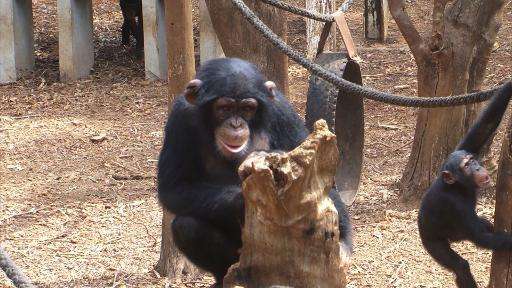You are here
Africa: Apes Lack Ebola Protection, Scientists Warn
Wed, 2015-04-22 10:46 — mike kraftALL AFRICA by Sarah Naraghi April 2, 2015
(Scroll down for releated report and story.)
Research on potential Ebola vaccines should seek to protect great apes as well as humans to prevent the disease from decimating gorilla and chimpanzee populations, say experts.
 Chimps play at the on Tacugama Sanctuary in Sierra Leone which is under threat of closure
Chimps play at the on Tacugama Sanctuary in Sierra Leone which is under threat of closure
Work is continuing on trials of potential Ebola vaccines and the rate of fresh cases of the disease in the West African outbreak is slowing.
But unrelated outbreaks among Central Africa's great ape populations could happen at any time, says a report from the International Union for Conservation of Nature (IUCN). The study estimates that Ebola has wiped out thousands of gorillas and chimpanzees since the early 2000s, with some rainforests experiencing a 90 per cent decline in their great ape populations...
...according to Doug Cress, who coordinates the UN's Great Apes Survival Partnership programme, the situation is "a waiting game". He fears that, if no vaccine is forthcoming, the next outbreak could wipe out some ape populations already decimated by poaching, disease and habitat loss.
Read complete story.
http://allafrica.com/stories/201504211398.html
Read International Union for Conservation of Nature Regional plan.
http://static1.1.sqspcdn.com/static/f/1200343/25932483/1423326166303/WEA_apes_plan_2014_7MB.pdf?token=gyJUO5mtXzPrDvzxrA70rCS8FiE%3D
-0-
Ebola retreat brings cheer to Sierra Leone chimps
PHYS ORG by Rod Macjohnson April 21, 2015
Tom is a chimpanzee—one of around 5,500 in Sierra Leone for whom the tropical fever poses as deadly a threat as it does to humans.
His rainforest sanctuary in the verdant hills around the capital Freetown suddenly found itself forced to close in August last year as the virus overwhelmed the human population, killing thousands.
With money running out and only a skeleton staff looking after Tacugama Chimpanzee Sanctuary, Tom and around 85 companions were facing homelessness as the closure began to look permanent.
"We were all worried about what our lives would be like if the sanctuary was not opened again," staff member Abdul Koroma told AFP, adding that he and his fellow workers saw the park as "a baby we have nurtured".
And then one day in January, everything changed.

Recent Comments